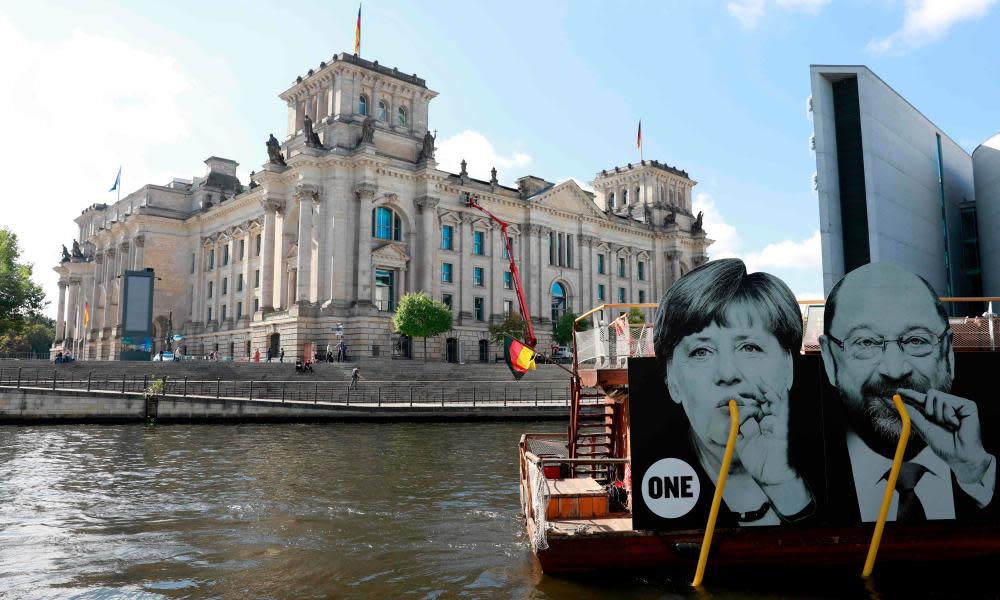Pressure grows on SPD to reconsider coalition talks with Angela Merkel

Germany’s president will meet with the leader of the Social Democrats today as the centre left faces growing pressure to consider talks about a centrist coalition with Angela Merkel’s Christian Democrats to avoid fresh elections in 2018.
Martin Schulz, the leader of the Social Democratic party (SPD), ruled out another “grand coalition” after his party’s worst postwar performance in federal elections in September. He reiterated his stance after the collapse on Sunday of talks about a three-way coalition between the CDU, the Free Democratic party (FDP) and the Greens.
But Germany’s president, Frank-Walter Steinmeier, a fellow Social Democrat, will appeal to Schulz to reconsider at a meeting between the two on Thursday. There is speculation that the SPD leader could face calls to step aside at a party conference in two weeks’ time if he refuses to change his stance.
The FDP’s walkout from coalition talks on Sunday night has thrown politics in Germany into a state of paralysis, described by Steinmeier as “a situation that the German federal republic … has never seen before”.
While postwar Germany has been ruled for periods by minority governments and snap elections have been called before, there has never been a comparable struggle to form a government directly after an election.
The national poll on 24 September showed a pronounced splintering of the vote, with six parties crowding into the Bundestag’s plenary chamber for the first time since the introduction of a 5% vote-share hurdle for parliamentary seats in 1953.
Merkel has indicated that she would prefer fresh elections over a minority government and would be willing to run again as her party’s candidate. While German media are in part attributing the collapse of the so-called “Jamaica” talks to a flaw in Merkel’s approach, support for the chancellor in the CDU has solidified after Sunday’s drama and a leadership challenge is unlikely.
Schulz’s position in the SPD is less stable. Like the FDP, the party is nervous about entering into another “grand coalition” with Merkel as a junior partner: its previous two partnerships in 2005-09 and 2013-17 were punished at the voting booth.
“We don’t want Austrian conditions,” said one of the SPD’s deputy leaders, Thorsten Schäfer-Gümbel, pointing at the political situation in Germany’s southern neighbour, where years of grand coalition rule have enabled the rise of a far-right party.
But many politicians on the centre left are equally nervous about further elections, which would not only hurt the SPD’s finances but could also result in a diminished share of the vote and more seats for the rightwing populist Alternative für Deutschland.
At a party group meeting on Monday, Schulz tried to pass a resolution affirming his position that the SPD was “not available for entering a grand coalition” and “not scared of fresh elections”, but ended up facing protests from more than 30 delegates who questioned its unambiguous language.
The party group leader Andrea Nahles afterwards hinted that the SPD could consider tolerating a minority government made up either of just Merkel’s party or a CDU-Green coalition: a solution that would run an even greater risk of allowing a conservative chancellor to take credit for social democratic ideas, however.
Another rumoured solution to the political deadlock – whereby grand coalition talks could be started only if Merkel, Schulz and the Christian Social Union leader, Horst Seehofer, all resigned – is unlikely to have any sympathisers among the CDU.
Already, there is speculation in the German press that the SPD party conference in two weeks’ time is likely to see Schulz make way for a new chancellor candidate or a new party leader, mooted to be either Manuela Schwesig, a former minister for family, or Olaf Scholz, the mayor of Hamburg.
Frankfurter Allgemeine Zeitung suggested that the only way out for Schulz, a former president of the European parliament, would be to drop his election-night promise and kickstart coalition talks with Merkel.
“He could show the FDP what taking responsibility means,” said the centre-right broadsheet. “And he could demonstrate his instinct to show that his European moment has come.”

 Yahoo News
Yahoo News 
